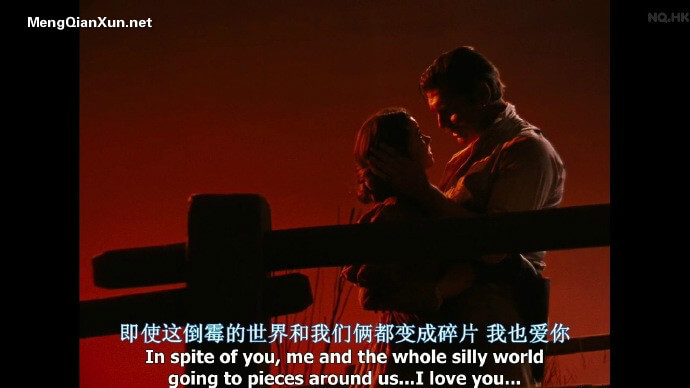木兰诗
无名氏
唧唧[1]复唧唧,木兰当户[2]织。
不闻机杼声[3],唯[4]闻女叹息。
问女何所思,问女何所忆[5]。
女亦无所思,女亦无所忆。
昨夜见军帖[6],可汗[7]大点兵[8]。
军书十二[9]卷,卷卷有爷名。
阿爷[10]无大儿,木兰无长兄。
愿为市[11]鞍马[12],从此替爷征[13]。
东市买骏马,西市买鞍鞯[14]。
南市买辔头[15],北市买长鞭。
旦[16]辞爷娘去,暮宿黄河边。
不闻爷娘唤女声,
但闻黄河流水鸣溅溅[17]。
旦辞黄河去,暮至黑山[18]头,
不闻爷娘唤女声,
但闻燕山[19]胡骑[20]鸣啾啾[21]。
万里赴戎机[22],关山度若飞。
朔气[23]传金柝[24],寒光照铁衣。
将军百战死,壮士十年归。
归来见天子,天子坐明堂[25]。
策勋[26]十二转[27],赏赐百千强[28]。
可汗问所欲,木兰不用尚书郎[29]。
愿驰千里足,送儿还故乡。
爷娘闻女来,出郭[30]相扶将[31]。
阿姊闻妹来,当户理红妆[32]。
小弟闻姊来,磨刀霍霍[33]向猪羊。
开我东阁门,坐我西阁床。
脱我战时袍,着[34]我旧时裳。
当窗理云鬓[35],对镜帖花黄[36]。
出门看伙伴[37],伙伴皆惊惶。
同行十二年,不知木兰是女郎!
雄兔脚扑朔[38],雌兔眼迷离[39]。
双兔傍地走[40],安能辨我是雄雌。
注释:
[1] 唧唧:叹息声。
[2] 当户:对着门户。
[3] 机杼声:指织机在织布时发出的声响。
[4] 唯:只。
[5] 忆:思念。
[6] 军帖:征兵的文书。
[7] 可汗:汉代以后西北地区少数民族政权对君主的称呼。
[8] 点兵:征集兵士。
[9] 十二:在这里表示多数,并非确实的数字。
[10] 爷:父亲,当时北方称呼父亲为“阿爷”。
[11] 市:购买。
[12] 鞍马:马鞍和马匹。
[13] 征:出征,上战场打仗。
[14] 鞯:马鞍下的垫子。
[15] 辔头:马嚼子和缰绳。
[16] 旦:早晨。一作“朝”。
[17] 溅溅:水流声。
[18] 黑山:今天的杀虎山,在内蒙古自治区呼和浩特市东南百里。
[19] 燕山:一说是燕然山,今蒙古人民共和国境内的杭爱山;一说是河北的燕山山脉。
[20] 胡骑:胡人的战马。
[21] 啾啾:马鸣声。
[22] 戎机:军机,这里指战争。
[23] 朔气:北方的寒风冷气。
[24] 金柝:刁斗,一种用铜做成的器皿,容量相当于一斗,形状似带柄的锅。是古时军中用具,白天当锅做饭,晚上当梆子打更。
[25] 明堂:古代皇帝听政、选士的地方,即殿堂。
[26] 策勋:记功授爵。
[27] 十二转:古代依军功授爵,军功每加一等,官爵也随升一等,谓之一转。军功及勋位共分十二等,十二转是功勋和官爵最高的一级。
[28] 强:有余。百千强是说赏赐千百金以上。
[29] 尚书郎:官名,魏、晋以后在尚书台(省)下分设若干曹(部),主持各曹事务的官通称尚书郎。
[30] 郭:外城。
[31] 相扶将:互相搀扶着。这句是说父母互相搀扶着到城外来迎接木兰。
[32] 理红妆:梳妆打扮。
[33] 霍霍:磨刀声。
[34] 着:穿。
[35] 云鬓:像云那样的鬓发,形容好看的头发。
[36] 花黄:古代妇女的一种面部装饰物。
[37] 伙伴:同伍的士兵。当时规定若干士兵同一个灶吃饭,所以称伙伴。
[38] 扑朔:动弹。
[39] 迷离:眯着眼。
[40] 傍地走:并排跑。
Song of Mulan
Anonymous
Alack, alas! Alack, alas!
She weaves and sees the shuttle pass.
You cannot hear the shuttle, why?
Its whir is drowned in her deep sigh.
“Oh, what are you thinking about?
Will you tell us? Will you speak out?”
“I have no worry on my mind,
Nor have I grief of any kind.
I read the battleroll last night;
The Khan has ordered men to fight.
The roll was written in twelve books;
My father’s name was in the nooks.
My father has no grown-up son,
For elder brother I have none.
I’ll buy a horse of hardy race
And serve in my old father’s place.”
She buys at the fair east and west
A steed with saddle fitting best;
She buys a long whip north and south
And metal bit for the horse’s mouth.
At dawn she leaves her parents by the city wall;
At dusk she reaches Yellow River shore.
All night she listens for old folk’s familiar call,
But only hears the Yellow River’s roar.
At dawn she leaves the Yellow River shore;
To Mountains Black she goes her way.
At night she hears old folk’s familiar voice no more,
But only on north mountains Tartar horses neigh.
For miles and miles the army march along
And cross the mountain barriers as in flight.
The northern wind has chilled the watchmen’s gong,
Their coat of mail glistens in wintry light.
In ten years they’ve lost many captains strong,
But battle-hardened warriors come back in delight.
Back, they have their audience with the Khan in the hall,
Honors and gifts are lavished on them with grace.
The Khan asks her what she wants after all.
“A camel fleet to carry me to my native place.”
Hearing that she has come, and leaning on each other,
Her parents come to meet her at the city gate.
Her sister rouges her face and her younger brother,
Sharpening knife, kills pig and sheep to celebrate.
She opens the doors east and west,
And sits on her bed for a rest.
She doffs her garb worn under fire,
And wears again female attire.
Before the window she arranges her hair,
And in the mirror sees her image fair.
Then she comes out to see her former mate,
Who stares at her in amazement great:
“We have marched together for twelve years,
But did not know there was a lass ‘mid our compeers!”
Both buck and doe have lilting gait
And both their eyelids palpitate.
When side by side two rabbits go,
Who can tell the buck from the doe?
未经允许不得转载:帕布莉卡 » 南北朝民歌《木兰诗》 -经典诗词英译-中英双语赏析
 帕布莉卡
帕布莉卡


 爱是一颗心遇到另一颗心(出处+配图)
爱是一颗心遇到另一颗心(出处+配图)  《乱世佳人》电影专题
《乱世佳人》电影专题

